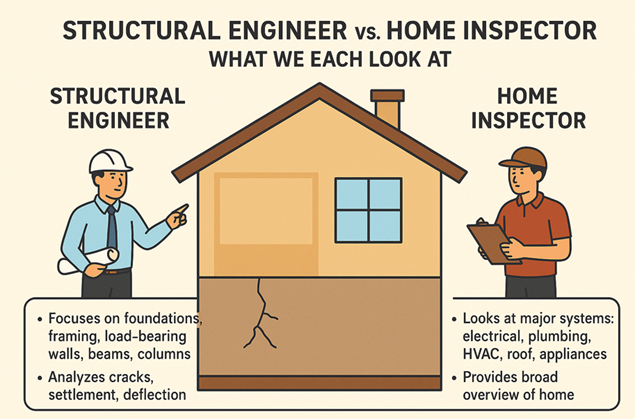Key Differences Between Home Inspectors and Structural Engineers
Introduction
As a structural engineer in Kansas City, I often meet homeowners, buyers, and realtors who are not quite sure whether they need a home inspector, a structural engineer, or both. The two roles sound similar, and in some ways they overlap, but the depth of what we look at and the conclusions we can provide are very different. This blog clarifies the distinction between the two, highlights the unique value of a structural engineering inspection, and helps you understand when each professional is the right fit.
The Role of a Home Inspector
General Scope
A home inspector provides a broad overview of a home’s overall condition. Their job is to give buyers and homeowners a general sense of how well the systems and components in the home are functioning.
Focus Areas
During an inspection, home inspectors look at the electrical system, plumbing, HVAC, roof, appliances, and other visible elements of the home. Their evaluation is largely visual and they will be checking whether things appear to be operating correctly and safely. They will often give a rating to describe the severity of an issue but will generally not provide solutions to remedy those issues.
Deliverable
At the end of the inspection, a home inspector produces a report. This document highlights areas that may require repair, maintenance, or further evaluation by a specialist.
The Role of a Structural Engineer
Specialized Expertise
As structural engineers, we are licensed professionals trained to analyze and design structural solutions. We understand how loads move through a home, how materials behave, and how construction practices impact long-term stability of the structure and foundation for the home.
Focus Areas
Structural engineers focus on the main structural components of the home, such as foundations, framing systems, load-bearing walls, beams, and columns. We investigate cracks, settlement, deflection, corrosion, and other signs of stress or deterioration. We evaluate not just what’s visible but also what it means for the structure’s safety and longevity.
Methods Used
Unlike home inspectors, we perform engineering analysis. That can include precise measurements, reviewing construction plans, or considering soil and drainage conditions. With this information, we can determine whether an issue is merely cosmetic or if structural repairs are needed. If the issue is determined to be structural, we recommend appropriate solutions to fix the issue.
Deliverable
Our findings are presented in a professional engineering letter or a stamped report. This document provides definitive conclusions about the structural condition of the home and, when necessary, outlines repair recommendations that contractors or foundation repair companies can follow.
Key Differences Between Home Inspectors and Structural Engineers
Depth vs. Breadth
Home inspectors are generalists who cover a wide range of systems but do not go deep into any one area. Structural engineers, on the other hand, focus narrowly on just the structural components of a home, but analyze them in great depth.
Licensing and Liability
Engineers are licensed professionals with legal authority to design, approve, and oversee structural work. That means our evaluations carry more weight with contractors, municipalities, lenders, and insurers.
When They Work Together
In practice, home inspectors and engineers often complement one another. For example, a home inspector might flag a crack in a foundation. A structural engineer is then called in to determine whether it is cosmetic or a sign of a serious structural problem and outline what should be done next.
When Should You Call a Structural Engineer Instead of a Home Inspector?
While a home inspector is usually the right starting point for a general home purchase, there are situations where you should go directly to a structural engineer:
Cracks in walls, ceilings, or foundations.
Doors or windows sticking, sloping floors, or uneven settlement.
Bowed walls, sagging beams, or noticeable structural damage after storms.
When a mortgage lender, insurance company, or city requires an engineer’s letter.
Common Misconceptions
Myth: Home inspectors can provide structural solutions.
Reality: Home inspectors can point out concerns, but they are generally not qualified to diagnose structural issues or recommend engineered solutions.
Myth: Engineers are only needed when major problems exist.
Reality: Many times, homeowners call me for peace of mind. I can confirm that a crack is minor and not a structural concern. If there is not a structural issue in the home, I can provide strategies to maintain your home which saves time, money, and unnecessary worry in the future.
Closing Thoughts from a Structural Engineer
Home inspectors and structural engineers each play important roles in protecting your investment. A home inspector offers a broad overview of the property’s systems, while a structural engineer provides specialized analysis and solutions when structural concerns arise.
If you’re ever unsure about the condition of a home’s foundation or framing, you can find reassurance in hiring a structural engineer such as Resolve Engineering. If you would like a structural inspection or foundation inspection for your Kansas City home, contact us today and we would be happy to help!

